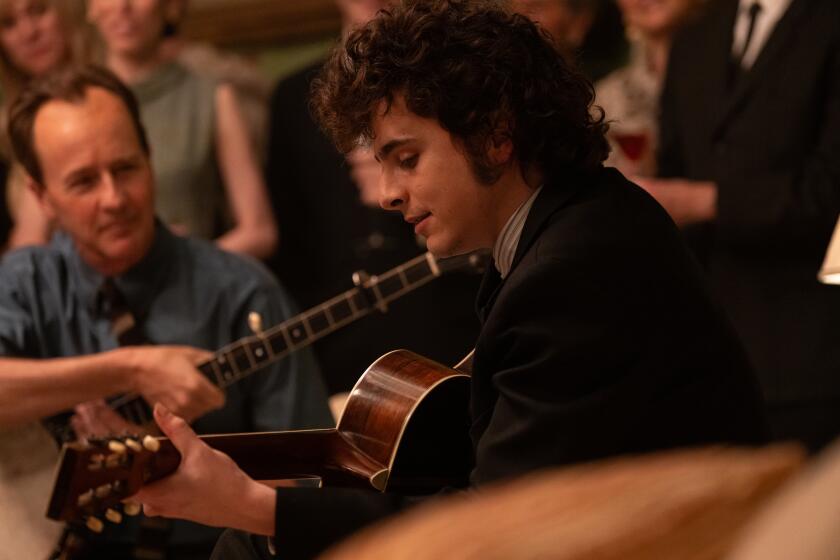Review: In ‘Miss Julie,’ Liv Ullmann is too faithful to Strindberg play
The comely mistress of the manor is hot and bothered, the homely cook is cool and collected, and the dashing valet is desired by both. In “Miss Julie,” an Irish period piece of class divides, sexual politics and power games, things will end badly, one suspects, though the denouement still shocks.
Director Liv Ullmann — whose best work behind the camera remains 2000’s “Faithless,” written by the late great Ingmar Bergman — begins with a potent troika of stars in Jessica Chastain, Colin Farrell and Samantha Morton. These are always exciting actors to watch, well equipped to handle the intensity and intimacy of August Strindberg’s passion play, which Ullmann adapts all too faithfully.
Set in the 1880s, Victorian-era morality and propriety are quickly discarded, along with caution and clothes, as one long, hot summer night is overtaken by sweltering libidos. If only “Miss Julie” could have shed the strictures of the stage as easily.
It is a tortured triangle from the outset. A winsome Julie (Chastain) taunts and tempts John (Farrell), her father’s handsome serving man. By all measures of the time, she is the one in control. Yet the valet is as aware of his sensual appeal as he is of his station, which makes him dangerous. Though he’s pledged to marry the proper cook Kathleen (Morton), he’s torn by his complicated longing for the baron’s daughter.
Juicy issues for the actors to chew on, and they do, with moments that sear like acid on skin. But the heat that should saturate the film as betrayals mount and boundaries are broken flickers and dies many times over “Miss Julie’s” languid two-plus hours.
As the film opens, John has just returned to the country estate. The baron is due back the next day, so there are meals to plan, boots to shine and other metaphors about one’s relative status in life to polish.
Kathleen is in the kitchen, weary from a long day. Julie is fresh and flitting in and out, making demands, perfuming the air with her arrogance and entitlement. John is the man in the middle. Warm and at ease with Kathleen, tense and touchy with Julie. Whether they’ve played these games before is a mystery, but on this night things escalate quickly.
Watching Farrell’s attitude adjustments as John reacts to each of the women is like witnessing a chameleon change colors. Pragmatic Kathleen and presumptuous Julie may be divided by social class, but they are both women on a mission. This is 1880, however, and Kathleen knows her place, retreating to her room while the cat and mouse play. It soon becomes clear in the exchanges between Julie and John that sex is secondary; power is the end game between them, cruelty the central weapon.
Morton, so good at women churning on the inside — the young war widow in “The Messenger,” the insistent cancer warrior in “Decoding Annie Parker” — does carefully contained work in “Miss Julie.” The barest tightening of her lips, the tension in her shoulders, speak of surviving within the class lines drawn around her.
Chastain, in contrast, lets Julie and her emotions come undone. Nothing is off-limits, and the actress makes the deconstructing woman fascinating, from the flush in her cheeks to the loosening of her hair. It’s a raw, visceral performance, with so much intensity on-screen you might be as broken down as she is by the end.
The look of the film is lush, ripe, gorgeous, with director of photography Mikhail Krichman given time to caress the faces, luxuriate over the sets, frame the scenes like moving portraits ready for gallery hanging. Images have proved to be Ullmann’s strength since the actress began seriously stepping behind the camera in the 1990s. Like the other films she’s directed, “Miss Julie” makes for beautiful watching.
It is in binding the look, the acting and the stories together that issues arise.
Certainly she learned a thing or two from Bergman. Their collaboration would shape her life professionally and personally — she starred in nine of his films, they had a daughter together, and his script for “Faithless” gave Ullmann a firm foundation to her strongest film. Whether he was providing other artistic input at the time, the performances and plot in “Faithless” meshed, and the magnetic pull between actors remained strong.
“Miss Julie” is not so fortunate.
Despite a scattering of wonderfully wrought moments, there is far more disconnection than connection. The dialogue drifts toward monologues and melodrama, separating the characters just as they should be drawing closer. “Miss Julie” aches for a firmer hand stirring its passions. Instead the film falls apart faster than its players.
------------
‘Miss Julie’
MPAA rating: PG-13 for mature thematic material involving sexuality, disturbing images, and language
Running time: 2 hours, 9 minutes
Playing: Landmark Theatres, West Los Angeles
More to Read
Only good movies
Get the Indie Focus newsletter, Mark Olsen's weekly guide to the world of cinema.
You may occasionally receive promotional content from the Los Angeles Times.











